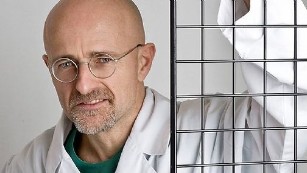When it comes to carrots, we strongly recommend you to eat them in large amounts, not only because of their amazing taste, but because they provide numerous essential nutrients.
Carrots are excellent sources of vitamin A, C, D, E, K, B1 and B6, biotin, magnesium, calcium, potassium, phosphorus, and organic sodium. This root vegetable also contains phytonutrients like lutein, lycopene, anti-oxidants alpha, beta and gamma carotenes, xanthophylls, and zeaxanthin. It is important for you to know that phytonutrients are extremely effective in preventing and treating many diseases.
Health Benefits of Carrots:
Acidosis: The vital organic alkaline elements in carrots are essential for balancing the blood acidity and blood sugar.
Acne: Stressed liver can indicate signs of toxic accumulation through the skin. Carrots possess powerful cleansing properties that help detoxify the liver.
Anemia: Carrot’s molecules are closest to human’s hemoglobin molecules, which makes them extremely helpful in blood-building.
Atherosclerosis: The cleansing power of carrot juice can significantly lower the risk of heart disease and stroke by eliminating even the old build-up of arterial deposits.
Asthma: The powerful antioxidants contained in carrots keep the respiratory system safe from infections and free-radical attacks.
Cholesterol: Carrots are well known by their rich pectin amount, a fiber that can help reduce the levels of LDL (bad) cholesterol.
Constipation: if you suffer from chronic constipation, then a combination of five parts of carrot juice and one part of spinach juice daily will be of a great help for you.
Cancer: Studies have proven that carrots can reduce the risk of cancer.
Congestion: Carrot juice is very efficient in discharging mucus from the ear, nose and throat area, alleviating nasal congestion, sinusitis, phlegm and mucus in the throat and other similar disorders.
Eyesight: Beta-carotene, lutein, and zeaxanthin are powerful phytonutrients that maintain your eyesight in perfect condition. Regular consumption of carrot juice can protect you from astigmatism, macular degeneration, and cataracts.
Emphysema: Smokers, as well as, passive smokers are strongly recommended to consume carrot juice daily to reduce the effect of smoking.
Fertility: Enzyme and nutrient deficiency is one of the reasons for infertility. But, you can nourish your body back to fertility by taking carrot juice regularly.
Inflammation: The symptoms of arthritis, rheumatism, and gout can be significantly improved by consuming carrot juice thanks to their powerful anti-inflammatory properties.
Immune System: Fresh carrot juice is considered the best immune-booster since it stimulates production and performance of white blood cells; building resistance for many types of infections.
Pregnancy: Consuming carrot juice during pregnancy, and especially during the last few months, will radically reduce the chances of jaundice in baby.
Kidney Health: The healing properties in carrot juices are beneficial for cleansing and detoxifying the kidneys. Despite many juicing “experts” claims that people with kidney failure aren’t allowed to drink juices, this story reveals the miraculous benefits of carrots for kidneys.
Nursing Mothers: The abundance of vitamins and minerals in carrot juice can significantly improve both the quality and quantity of a mother’s breast milk.
Thread worms: Consuming a small cup of carrot juice each morning for a period of 7 days can help clear up thread worms in children.
Skin Problems: The rich content of vitamin C and other nutrients in carrot juice help nourishes the skin, preventing dry skin, psoriasis, and other skin problems.
Ulcers: The nutrient presence in carrots helps nourish cells that have been starved of nutrients which result in ulcers.
Water Retention: Carrot juice is a diuretic that is extremely effective in removing excess fluids from the body, thus reducing water retention. This can be especially recommended for women during their monthly menstruation cycle.
Acne: Stressed liver can indicate signs of toxic accumulation through the skin. Carrots possess powerful cleansing properties that help detoxify the liver.
Anemia: Carrot’s molecules are closest to human’s hemoglobin molecules, which makes them extremely helpful in blood-building.
Atherosclerosis: The cleansing power of carrot juice can significantly lower the risk of heart disease and stroke by eliminating even the old build-up of arterial deposits.
Asthma: The powerful antioxidants contained in carrots keep the respiratory system safe from infections and free-radical attacks.
Cholesterol: Carrots are well known by their rich pectin amount, a fiber that can help reduce the levels of LDL (bad) cholesterol.
Constipation: if you suffer from chronic constipation, then a combination of five parts of carrot juice and one part of spinach juice daily will be of a great help for you.
Cancer: Studies have proven that carrots can reduce the risk of cancer.
Congestion: Carrot juice is very efficient in discharging mucus from the ear, nose and throat area, alleviating nasal congestion, sinusitis, phlegm and mucus in the throat and other similar disorders.
Eyesight: Beta-carotene, lutein, and zeaxanthin are powerful phytonutrients that maintain your eyesight in perfect condition. Regular consumption of carrot juice can protect you from astigmatism, macular degeneration, and cataracts.
Emphysema: Smokers, as well as, passive smokers are strongly recommended to consume carrot juice daily to reduce the effect of smoking.
Fertility: Enzyme and nutrient deficiency is one of the reasons for infertility. But, you can nourish your body back to fertility by taking carrot juice regularly.
Inflammation: The symptoms of arthritis, rheumatism, and gout can be significantly improved by consuming carrot juice thanks to their powerful anti-inflammatory properties.
Immune System: Fresh carrot juice is considered the best immune-booster since it stimulates production and performance of white blood cells; building resistance for many types of infections.
Pregnancy: Consuming carrot juice during pregnancy, and especially during the last few months, will radically reduce the chances of jaundice in baby.
Kidney Health: The healing properties in carrot juices are beneficial for cleansing and detoxifying the kidneys. Despite many juicing “experts” claims that people with kidney failure aren’t allowed to drink juices, this story reveals the miraculous benefits of carrots for kidneys.
Nursing Mothers: The abundance of vitamins and minerals in carrot juice can significantly improve both the quality and quantity of a mother’s breast milk.
Thread worms: Consuming a small cup of carrot juice each morning for a period of 7 days can help clear up thread worms in children.
Skin Problems: The rich content of vitamin C and other nutrients in carrot juice help nourishes the skin, preventing dry skin, psoriasis, and other skin problems.
Ulcers: The nutrient presence in carrots helps nourish cells that have been starved of nutrients which result in ulcers.
Water Retention: Carrot juice is a diuretic that is extremely effective in removing excess fluids from the body, thus reducing water retention. This can be especially recommended for women during their monthly menstruation cycle.
Consumption Tips
Carrots that are shorter than 6 inches have a tendency of being sweeter. So, make sure you chose the shorter variety if you like to enjoy it sweet, but if you want less sweet then chose the longer variety.
Carrots that are shorter than 6 inches have a tendency of being sweeter. So, make sure you chose the shorter variety if you like to enjoy it sweet, but if you want less sweet then chose the longer variety.


















